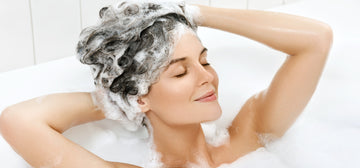Is tea tree oil shampoo good for dandruff?
Dandruff can be embarrassing when flakes of skin fall on clothing. It is a condition that causes dryness and itching of the scalp, although it is not harmful.
Generally, dandruff sufferers do not require medical attention. Simple home remedies, such as using tea tree shampoo, can be effective.
Tea tree oil is obtained from the leaves of this shrub through distillation. It is valued for its antiseptic qualities and is used effectively to treat cuts, insect bites, acne, athlete's foot, mite control, fungal nail infections, lice and more.
For this reason and because we use it on our clients, we at Juliet Hair Studio are going to talk about tea tree oil shampoo for dandruff and all the details you're interested in.
Effect of tea tree oil on dandruff
Many people think they understand what dandruff is, but they are often mistaken. They notice white flakes on their shoulders, assume it is dandruff, and respond by liberally applying oil to the scalp.
The common misconception is that dandruff is due to a dry scalp. Why else would there be flakes?
However, dry scalp and dandruff are two different problems, with equally different solutions.
What is dandruff itself?
Dandruff is usually caused by a naturally occurring fungus called Malassezia Globosa. This fungus resides on the scalp and feeds on the sebum secreted by the sebaceous glands.
Sebum production can be altered by various factors such as hormonal imbalances, environmental changes or stress.
If the scalp begins to overproduce sebum for any reason, the fungus multiplies rapidly and converts the oil into oleic acid.
What can I do?
This is what really constitutes dandruff, and it is important to understand this before trying any of the many home remedies available to treat it.
Studies have shown that tea tree oil can be very effective against dandruff, as it eliminates the excess oil that feeds it and reduces the growth of the fungus responsible.
In addition, the anti-inflammatory properties of tea tree oil can soothe an itchy scalp.
What are the symptoms of dandruff, and what may be its causes?
Symptoms of dandruff then include flaking of the scalp, itching of the head, red areas on the scalp, areas of hair loss, blisters or skin inflammation, and a yellowish crust on the scalp, which is typical in infants.
According to experts, the causes of dandruff can be varied and include the presence of fungi, excessively dry skin, a high amount of yeast on the skin, poor hygiene and contact dermatitis.
Benefits of tea tree oil
Tea tree oil offers multiple benefits for hair and skin thanks to its properties:
- It contains a high concentration of Terpinen-4-ol, the main component that promotes its use to treat various scalp, hair and skin conditions.
- It has antibacterial qualities that can significantly reduce the growth of bacteria and viruses.
- Its anti-inflammatory properties soothe irritated skin.
- It includes a potent antifungal agent capable of eliminating fungi and yeasts, which also contributes to odor control.
- It acts as a disinfectant and has antiseptic characteristics, which makes it effective for treating wounds.
- It removes excess oil and cleanses buildup on the skin, as well as unclogs pores.
- It's moisturizing properties help restore skin hydration.
- Relieve itching associated with scalp problems or acne.
- It can regulate sebum production on both the face and scalp.
- Tea tree oil can also strengthen the hair cuticle and improve hair texture.
Useful changes to combat dandruff
If you suffer from dandruff, we recommend using a shampoo with at least 5% tea tree oil. In our salon, we use Kooswalla Tea Tree Essence Shampoo, and we have found this shampoo to be more than effective in combating fungus.
It also increases the frequency of hair washing. If you currently wash your hair a few times a week, try washing daily or every other day. Lack of regular washing can aggravate dandruff.
Other techniques to control dandruff
- Combine tea tree oil with other essential oils, such as argan oil, which regulate microbes and protect the scalp from infection.
- Incorporate omega-3 into your diet, as this nutrient is crucial for regulating the skin's sebum production, and a deficiency can intensify dandruff.
- Get some sun! Sunlight helps inhibit yeast production and other skin conditions on the scalp, although it's important not to overdo sun exposure to avoid other health risks.
- And above all, avoid stress. Stress can exacerbate skin conditions, including dandruff.
It is also advisable to use the full line of tea tree oil products if you have decided to treat your dandruff with tea tree oil.
Here you can see the full range of tea tree oil products that we use daily in our salon with our services, available for you to receive in the comfort of your home.
F&Q about tea tree oil shampoo for dandruff
Does tea tree oil shampoo help dandruff?
Yes, tea tree oil shampoo is good for dandruff due to its antifungal and antibacterial properties.
Should tea tree oil shampoo for dandruff treatment be used with other products?
Not necessarily, but it is beneficial to combine it with other products such as conditioners or specific dandruff treatments to improve results.
Is adding tea tree oil to dandruff shampoo better than a tea tree oil shampoo?
Using a shampoo formulated with tea tree oil is generally safer and more effective, as it is designed to have the proper concentration and ensure even distribution of the oil on the scalp. Adding oil on your own can lead to incorrect dosage and possible irritation.





